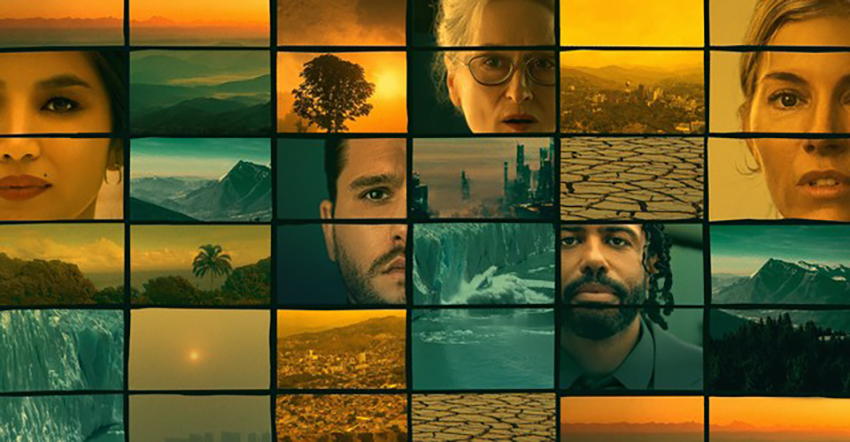Review: Extrapolations
This article contains spoilers for the Television series, Extrapolations.
Extrapolations is an eight-episode anthology series which explores a number of environmental consequences based on scientific projections for a given future year. With a large number of famous actors supporting the project, including Meryl Streep, Kit Harington, Tobey Maguire, Sienna Millar, Forest Whitaker, David Schwimmer, Heather Graham, and Diane Lane, to name a few, it creates a compelling story about individuals, families, and organisations from around the globe caught in the confronting aftermath of climate change and global warming.
Each episode focuses on a single year, the corresponding temperature increase, a specific ecological issue, and a unique story, with some narrative threads weaving throughout the series.
I happened to watch this series while participating in South Australia’s Uniting College for Leadership and Theology (UCLT) new Ecotheology course, taught by renowned climate theologian Rev. Prof. Vicky Balabanski and Dr Toar Hutagalung. United Theological College (UTC) in Sydney currently has Dr Clive Pearson teaching Ecological Theology. The television show was a fascinating conversation partner to the theological and environmental research that was presented in the semester long subject.
The series opens in 2037, and a 1.55 degree Celsius temperature increase, with a protest surrounding the COP42 Climate Summit. Corporations and governments are arguing about allowing the annual temperature rise to be 2 degrees. This is despite the very real warnings from Paris in 2015 about the catastrophic consequences if it were allowed to rise to 1.5 degrees. The world has already seen the predicted changes, but corporations are more concerned about national economies and their profits, despite being fully aware of the consequences of their decisions and actions. The increase is accepted by the politicians due to their control by corporations.
Sadly, we have already seen some of these consequences. There are some theologians and scientists suggesting that we need to change the language of “global warming” and “climate change” as these are not forceful enough. Global weirding or global boiling are offered as more accurate substitutes. Global weirding has already resulted in:
- Melting ice caps and glaciers
- Rising sea levels
- Crops unable to grow due to increased droughts
- Increasing extinction rates of plants and animals
- Increase in disease
- Starvation of animals and humans
- Ecological refugees having to move because homelands can no longer produce food, islands are disappearing under water, or areas being made unliveable by disasters
- Clean water shortages
- Increased extreme weather events like fires, tornadoes, hurricanes, floods, and storms
Both causes and consequences of climate change need to be understood and reflected upon seriously by Christians. Theological reflection is vitally important if Christians are to respond to the crisis the planet is facing with love, comprehension, rigor, and action.
The second episode is set in 2046. There is now a 1.8 degree temperature rise and 411,227 species have become extinct in the 21st century. This episode focuses on a scientist who is communicating with the last humpback whale in existence in the midst of the sea temperature rising, krill dying, and the food chain collapsing. She has already witnessed the extinction of elephants, tigers, orangutans, polar bears, and other animals in her lifetime. Scientific advances have meant that humans and some animals can communicate on a simplistic level, so she talks to the humpback about failing to find a male she believes she can hear. It is actually a prerecorded call, designed to get the female to a certain place so her genetic material and memories can be added to a species vault in the event that humans can develop a way of resurrecting extinct species.
Care for other non-human species is paramount for Christians. As part of our commission to be good stewards of God’s creation, theologians argue that we need to be working with God in caring for all of nature. This includes animals, plants, and entire ecosystems.
Jesus’ incarnation can be understood to show God’s affinity for all of creation and that God’s love is ever present. But some believe it goes deeper than this. God’s incarnation can also be understood to be microcosmic. The concept of deep incarnation goes beyond the macrocosmic aspect of saving human beings, but also to the microscopic or microcosmic aspect of redeeming the atoms, DNA, quarks, etc. of all creation. Niels Gregersen argues that the incarnation is actually about saving “the very tissue of biological existence, and system of nature”. Therefore, God knows and feels the pain, the cry, the childbirth groaning of all aspects of creation. It is not limited to only human experience.
2047 is the setting of the third episode and its 1.83 degree temperature increase. Seas have risen 38.61cm since the year 2000. This is having disastrous consequences on inhabited coastal regions. The story highlights the struggle of a Rabbi in Miami who is trying to petition the Department of Sea Level Mitigation to save his local synagogue. It is also the most theological episode, as a young Jewish girl wrestles with God, her father, and her growing understanding of the climate crisis.
Christians may be aware of “green theology”. This aspect of ecotheology has been criticised for being overly focused on the land. “Blue theology”, also known as “hydrotheology”, is a newer branch of ecotheology that prioritises water and all it contains in the oceans, seas, rivers, lakes, etc. It acknowledges that all of nature has intrinsic value, not just humans, and is about solidarity with the water and all that it touches – animals, plants, and humans. It also has a critical approach against capitalism because it questions whether there are alternative, less problematic approaches to interacting with water and its contents.
Blue discipleship is to stand “against systems and practices that hinder the sea from flourishing”. It is also an act of healing the oceans because this is an act of healing humanity. Resurrecting creation, by taking care of it, is another way to embody the meaning of Christ’s resurrection. A blue spirituality is something that Christians can cultivate. It is a way of engaging and caring for the world that recognises the aliveness of creation and that it has an important relationship with humankind.
The final episode is set in 2070. The temperature has risen by 2.59 degrees and atmospheric carbon dioxide sits at 564 parts per million, well above the safe level of 350ppm. The CEO of Alpha International, the main corporate entity of the series, is called before The Hague to stand trial before the International Criminal Court on the charge of ecocide. Throughout the series, his decisions have directly contributed to growing ecological problems for the sake of profit and market control. This episode explores the role of human responsibility in the unfolding environmental disaster.
As the church enters the Season of Creation (1 September – 4 October), perhaps we too can look at our personal and collective responsibility to the world. The Season of Creation is the “annual ecumenical celebration of prayer and action for our common home. It is a time to renew our relationship with our Creator and all creation through celebration, conversion, and commitment together.” Common Grace has organised a Climate Challenge, where participants can learn about how to change diet, reduce purchases and exchange transport options. By joining the challenge participants will:
- Hop off the merry-go-round of overconsumption.
- Help raise funds for climate action.
- Prophetically demonstrate that our communities and our nation can act boldly to cut emissions.

It has been argued that the climate crisis is the single greatest threat to humanity and the planet. As such, Christians have a responsibility to respond with deep reflection and significant action to care for all of God’s creation.
Extrapolations is streaming now on Apple TV+.
Dr Katherine Grocott













